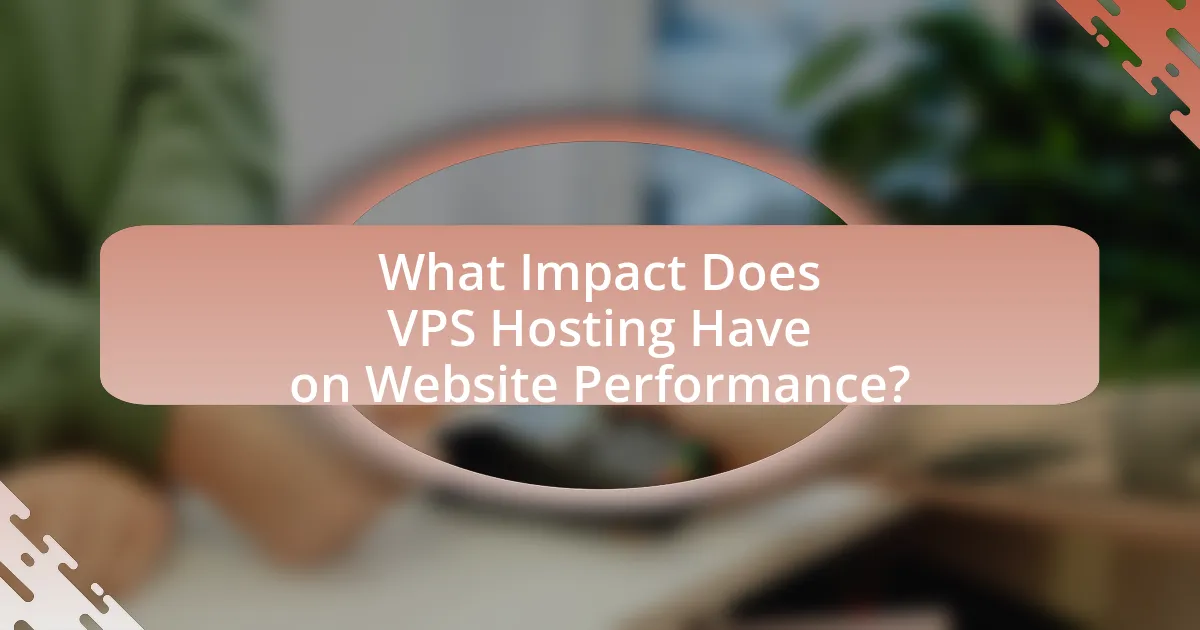VPS hosting, or Virtual Private Server hosting, is a web hosting solution that utilizes virtualization technology to provide dedicated resources on a single physical server. This article explores how VPS hosting enhances website performance through dedicated resources, improved security, and greater control over server configurations. Key features such as scalability, root access, and isolation from other users contribute to faster loading times, higher uptime rates, and reduced server congestion. Additionally, the article compares VPS hosting with shared and dedicated hosting, highlighting its advantages and scenarios where dedicated hosting may be preferable. Overall, VPS hosting emerges as a robust option for businesses seeking to optimize their online presence and improve website performance.

What is VPS Hosting and How Does It Work?
VPS hosting, or Virtual Private Server hosting, is a type of web hosting that uses virtualization technology to provide dedicated resources on a physical server. In VPS hosting, a single physical server is divided into multiple virtual servers, each operating independently with its own operating system and allocated resources such as CPU, RAM, and storage. This setup allows users to have more control and flexibility compared to shared hosting, as they can install custom software and configure settings according to their needs. VPS hosting is particularly beneficial for websites that require higher performance, reliability, and security, as it isolates each virtual server from others, reducing the risk of resource contention and enhancing overall website performance.
What are the key features of VPS Hosting?
VPS hosting offers several key features that enhance website performance, including dedicated resources, scalability, improved security, and root access. Dedicated resources ensure that each virtual server has its own allocated CPU, RAM, and storage, which prevents performance degradation during high traffic periods. Scalability allows users to easily upgrade their resources as their website grows, accommodating increased demand without downtime. Improved security features, such as isolated environments and customizable firewalls, protect against vulnerabilities and attacks. Root access provides users with complete control over their server environment, enabling the installation of custom software and configurations tailored to specific needs. These features collectively contribute to a more reliable and efficient hosting solution for websites.
How does virtualization technology enable VPS Hosting?
Virtualization technology enables VPS hosting by allowing a single physical server to be divided into multiple virtual servers, each operating independently. This is achieved through hypervisor software, which allocates resources such as CPU, RAM, and storage to each virtual server, ensuring that they function as separate entities. For instance, a physical server can host several VPS instances, each with its own operating system and applications, providing users with dedicated resources and improved performance. This technology enhances scalability and flexibility, as users can easily adjust their resource allocation based on demand, leading to optimized website performance.
What resources are allocated to a VPS?
A Virtual Private Server (VPS) is allocated specific resources including CPU, RAM, storage, and bandwidth. Each VPS operates within a dedicated environment, ensuring that these resources are reserved exclusively for the user, which enhances performance and reliability. For instance, a typical VPS may offer 1 to 8 CPU cores, 1 to 32 GB of RAM, and storage options ranging from 20 GB to several terabytes, depending on the hosting provider. This allocation allows for better control and customization compared to shared hosting, as users can configure their VPS to meet specific application requirements, leading to improved website performance.
How does VPS Hosting differ from shared and dedicated hosting?
VPS hosting differs from shared and dedicated hosting primarily in resource allocation and performance. In VPS hosting, a virtual private server is created within a physical server, allowing users to have dedicated resources such as CPU, RAM, and storage, which enhances performance and stability. In contrast, shared hosting involves multiple users sharing the same server resources, leading to potential performance issues during high traffic. Dedicated hosting provides an entire physical server exclusively for one user, offering maximum performance and control but at a higher cost. The distinct resource allocation in VPS hosting strikes a balance between the affordability of shared hosting and the exclusivity of dedicated hosting, making it a popular choice for businesses seeking improved website performance without the expense of dedicated servers.
What are the advantages of VPS over shared hosting?
VPS offers several advantages over shared hosting, primarily in terms of performance, control, and security. With VPS, users have dedicated resources such as CPU, RAM, and storage, which leads to improved website speed and reliability compared to shared hosting, where resources are distributed among multiple users. Additionally, VPS allows for greater customization and configuration options, enabling users to install specific software and applications tailored to their needs. Security is also enhanced in VPS environments, as users have isolated environments that reduce the risk of vulnerabilities associated with other users on shared servers. These factors collectively contribute to a more robust and efficient hosting solution for websites.
In what scenarios is dedicated hosting preferable to VPS?
Dedicated hosting is preferable to VPS in scenarios requiring maximum performance, security, and control. Businesses with high-traffic websites or applications that demand significant resources benefit from dedicated servers, as they provide exclusive access to hardware, eliminating resource contention. Additionally, organizations handling sensitive data, such as financial institutions or healthcare providers, often choose dedicated hosting for enhanced security measures and compliance with regulations like HIPAA or PCI-DSS. Furthermore, dedicated hosting is ideal for custom software applications that require specific configurations and optimizations, which are more easily implemented on dedicated servers compared to VPS environments.

What Impact Does VPS Hosting Have on Website Performance?
VPS hosting significantly enhances website performance by providing dedicated resources that improve speed and reliability. Unlike shared hosting, where multiple websites compete for the same server resources, VPS hosting allocates specific CPU, RAM, and storage to each virtual server. This dedicated environment reduces latency and increases loading speeds, which is crucial for user experience and SEO rankings. Studies show that websites with faster loading times can see conversion rates increase by up to 7% for every second of improvement. Additionally, VPS hosting allows for better scalability, enabling websites to handle traffic spikes without performance degradation, further solidifying its positive impact on overall website performance.
How does VPS Hosting improve website speed?
VPS hosting improves website speed by providing dedicated resources that are not shared with other users. This isolation allows for faster data processing and reduced latency, as the server’s CPU, RAM, and bandwidth are allocated specifically for one website. According to a study by Google, page load time is critical, with a 0.1-second delay potentially reducing conversions by 7%. VPS hosting minimizes such delays by ensuring that resources are consistently available, leading to quicker response times and enhanced user experience.
What role does resource allocation play in website speed?
Resource allocation significantly impacts website speed by determining how server resources, such as CPU, RAM, and bandwidth, are distributed among various processes and users. Efficient resource allocation ensures that a website can handle multiple requests simultaneously without delays, leading to faster load times. For instance, a study by Google found that a one-second delay in page load time can lead to a 20% decrease in conversions, highlighting the importance of optimal resource distribution. Properly allocated resources minimize bottlenecks and enhance overall performance, directly correlating with improved user experience and engagement.
How does reduced server congestion enhance performance?
Reduced server congestion enhances performance by allowing faster data processing and improved response times. When fewer requests compete for server resources, the server can allocate bandwidth and processing power more efficiently, resulting in quicker load times for websites and applications. Studies show that websites with optimized server performance can achieve load times under three seconds, significantly reducing bounce rates and improving user experience. This efficiency is particularly crucial during peak traffic periods, where reduced congestion can lead to a more stable and reliable service, ultimately increasing user satisfaction and engagement.
Why is uptime important for website performance?
Uptime is crucial for website performance because it directly affects user experience and site reliability. When a website experiences downtime, users cannot access content, leading to frustration and potential loss of traffic. According to a study by Gartner, even a single hour of downtime can cost businesses thousands of dollars in lost revenue and damage to reputation. Furthermore, search engines like Google consider uptime as a ranking factor; websites with higher uptime are more likely to rank better in search results, enhancing visibility and attracting more visitors. Therefore, maintaining high uptime is essential for ensuring optimal website performance and user satisfaction.
How does VPS Hosting contribute to higher uptime rates?
VPS Hosting contributes to higher uptime rates by providing dedicated resources and isolation from other users. This means that websites hosted on a VPS are less likely to experience downtime due to resource contention, which is common in shared hosting environments. According to a study by HostingFacts, VPS Hosting can achieve uptime rates of 99.9% or higher, significantly reducing the risk of outages compared to shared hosting, which often averages around 99.5%. The dedicated environment of VPS allows for better performance management and quicker response times during traffic spikes, further enhancing reliability and uptime.
What are the implications of downtime for businesses?
Downtime for businesses leads to significant financial losses, decreased customer trust, and potential damage to brand reputation. Research indicates that 98% of organizations report that a single hour of downtime costs over $100,000, highlighting the severe economic impact. Additionally, prolonged downtime can result in lost sales opportunities and reduced productivity, as employees are unable to perform essential tasks. The cumulative effect of these factors can hinder a company’s competitive edge in the market.

What Are the Additional Benefits of VPS Hosting?
VPS hosting offers several additional benefits, including enhanced performance, improved security, and greater control over server configurations. Enhanced performance is achieved through dedicated resources, which means that websites hosted on a VPS can handle higher traffic volumes without slowdowns. Improved security is a significant advantage, as VPS environments provide isolation from other users, reducing the risk of security breaches. Greater control allows users to customize their server settings and install specific software, tailoring the environment to their unique needs. These benefits collectively contribute to a more reliable and efficient hosting solution, making VPS hosting a preferred choice for businesses seeking to optimize their online presence.
How does VPS Hosting enhance security for websites?
VPS hosting enhances security for websites by providing isolated environments for each user, which minimizes the risk of security breaches. Unlike shared hosting, where multiple websites share the same server resources, VPS hosting allocates dedicated resources to each virtual server, reducing the likelihood of cross-contamination from other sites. Additionally, VPS hosting often includes advanced security features such as firewalls, DDoS protection, and regular software updates, which further safeguard against cyber threats. According to a study by the Ponemon Institute, organizations using VPS hosting reported a 30% decrease in security incidents compared to those on shared hosting platforms, demonstrating the effectiveness of VPS in enhancing website security.
What security features are typically included with VPS Hosting?
VPS hosting typically includes several key security features such as firewalls, DDoS protection, and regular backups. Firewalls help to monitor and control incoming and outgoing network traffic based on predetermined security rules, effectively blocking unauthorized access. DDoS protection safeguards against distributed denial-of-service attacks, ensuring that the server remains operational during such threats. Regular backups are essential for data recovery, allowing users to restore their systems to a previous state in case of data loss or corruption. These features collectively enhance the security posture of VPS hosting environments, making them a reliable choice for hosting websites.
How does isolation from other users improve security?
Isolation from other users improves security by creating a dedicated environment for each user, which minimizes the risk of unauthorized access and data breaches. In a Virtual Private Server (VPS) setup, each user operates within their own virtual space, preventing other users from accessing their files or applications. This separation is crucial because it limits the potential attack surface; if one user’s server is compromised, the isolation ensures that other users’ servers remain unaffected. Additionally, VPS hosting often includes enhanced security features such as firewalls and monitoring tools that further protect each isolated environment, making it significantly harder for malicious actors to exploit vulnerabilities.
What customization options does VPS Hosting provide?
VPS Hosting provides extensive customization options, allowing users to tailor their server environment to specific needs. Users can choose their operating system, install custom software, and configure server settings such as CPU, RAM, and storage based on their requirements. This level of control enables businesses to optimize performance, enhance security, and ensure compatibility with their applications, ultimately leading to improved website performance.
How can users tailor their VPS environment to specific needs?
Users can tailor their VPS environment to specific needs by customizing server configurations, selecting appropriate operating systems, and installing necessary software applications. Customizing server configurations allows users to allocate resources such as CPU, RAM, and storage based on their workload requirements, ensuring optimal performance. Choosing the right operating system, whether it be Linux or Windows, enables users to leverage specific features and compatibility with their applications. Additionally, installing software tailored to their business needs, such as web servers, databases, or content management systems, further enhances the functionality of the VPS. This flexibility in configuration and software choice is a key advantage of VPS hosting, as it allows users to create an environment that aligns with their unique operational demands.
What software can be installed on a VPS for enhanced functionality?
A variety of software can be installed on a VPS to enhance functionality, including web servers like Apache and Nginx, database management systems such as MySQL and PostgreSQL, and application frameworks like Node.js and Django. These software options allow for improved performance, scalability, and security of web applications. For instance, Apache and Nginx are widely used for serving web content efficiently, while MySQL and PostgreSQL provide robust data storage solutions. Additionally, using application frameworks can streamline development processes and enhance the overall user experience.
What are the best practices for optimizing VPS Hosting for performance?
To optimize VPS hosting for performance, implement resource allocation, use a content delivery network (CDN), and regularly update software. Resource allocation ensures that CPU, RAM, and disk space are appropriately assigned to applications, preventing bottlenecks. Utilizing a CDN reduces latency by distributing content closer to users, which can significantly enhance load times. Regular software updates, including the operating system and applications, patch vulnerabilities and improve efficiency, leading to better overall performance. These practices are supported by industry standards, which indicate that optimized resource management and updated software can improve server response times by up to 50%.
How can regular maintenance improve VPS performance?
Regular maintenance can significantly improve VPS performance by ensuring optimal resource allocation and system stability. Routine tasks such as software updates, security patches, and performance monitoring help prevent resource bottlenecks and vulnerabilities. For instance, a study by the International Journal of Computer Applications found that regular updates can reduce downtime by up to 30%, directly enhancing server responsiveness and reliability. Additionally, regular maintenance allows for the identification and resolution of potential issues before they escalate, thereby maintaining consistent performance levels and improving overall user experience.
What monitoring tools can help track VPS performance metrics?
Monitoring tools that can help track VPS performance metrics include Nagios, Zabbix, and New Relic. Nagios provides comprehensive monitoring capabilities, allowing users to track server uptime, resource usage, and network performance. Zabbix offers real-time monitoring and visualization of various metrics, including CPU load and memory usage, making it suitable for detailed performance analysis. New Relic specializes in application performance monitoring, providing insights into response times and transaction traces, which are crucial for optimizing web applications hosted on VPS. These tools are widely recognized in the industry for their effectiveness in monitoring and improving VPS performance.

